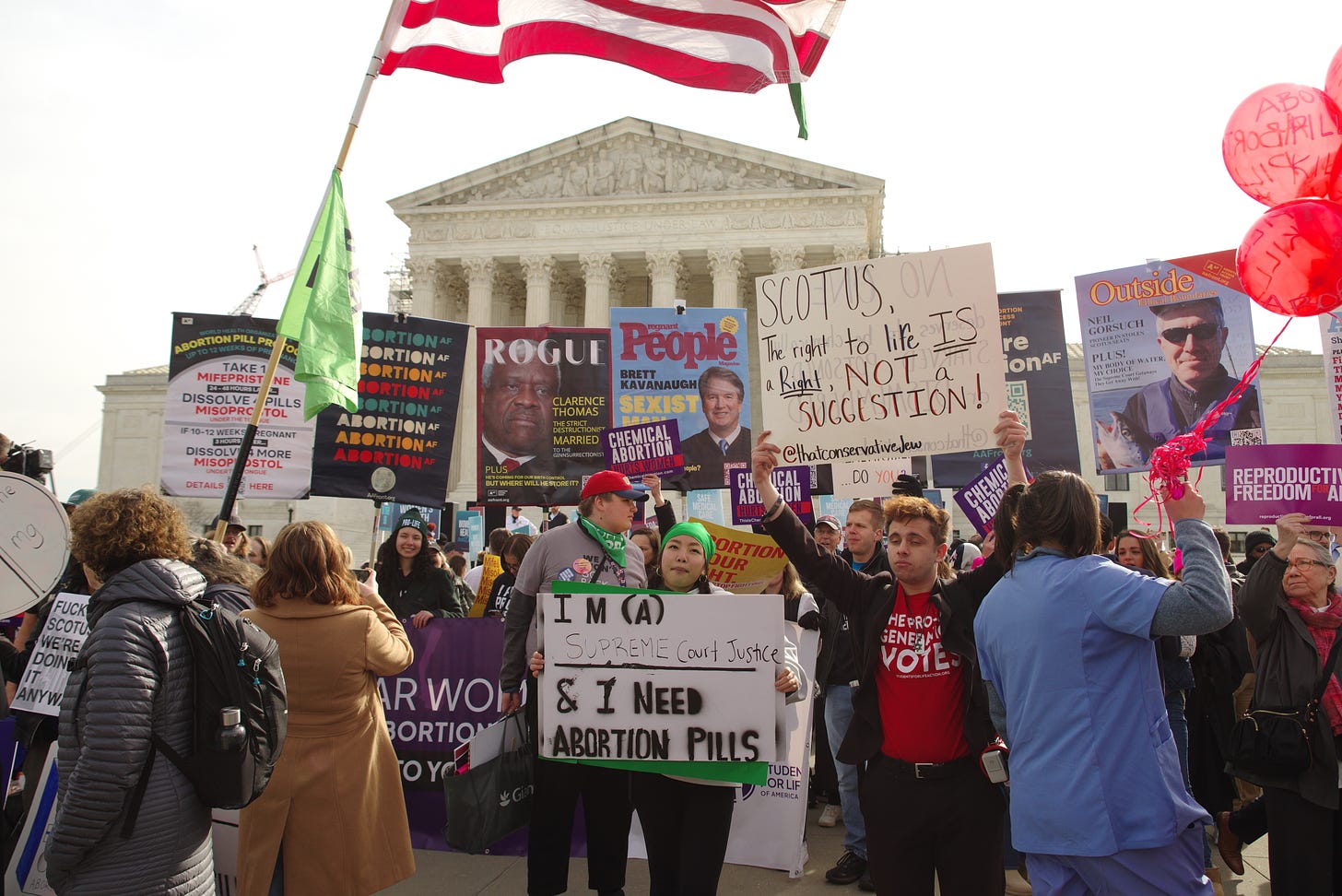Competing reproductive rights protesters outside the Supreme Court on March 26, 2024. Photo credit: Philip Yabut/Shutterstock
On October 28, 2023, the morning of her baby shower, 18-year-old Nevaeh Crain was nauseous, running a fever, and in pain. Soon, the Texas teenager began to bleed and she started to vomit. Nevaeh’s mother, Candice Fails, took her to the hospital, where Nevaeh was diagnosed with strep throat and sent home. A second visit also resulted in no care. Both times, ER staff ascertained that the fetus she was carrying had a heartbeat.
That was a problem—for Nevaeh. Texas operates under the strictures of a fetal heartbeat law, passed in 2021 and in full effect since the summer of 2022, when the Supreme Court of the United States handed down its decision in Dobbs v. Jackson Women's Health Organization. Dobbs has since activated abortion restrictions in 41 states; 13 states make no exceptions for rape, incest, non-viable pregnancies, or sparing the life of the mother.
But a few states, like Texas, also rushed to criminalize anyone who participates in terminating the life of a fetus, no matter how non-viable, and no matter how close a woman is to death. Let me be clear: no one in an emergency room wants a woman to bleed to death or die of septic shock. They are just too afraid, and in some cases, too ignorant, to touch her until that fetus’s heart stops. In the podcast, Candice remembers their third, and last visit to the hospital, as Navaeh died from miscarrying a baby she wanted.
Those of us who grew up in the pre-Roe v. Wade era tend to think about abortion as being about choice: that a woman has a right to decide whether to be a mother, and an equal right to a safe, professional termination. Roe, decided in 1973, was always a compromise in that regard. Under that decision, women could not be denied an abortion until the third trimester, when a fetus is technically viable. That made 99% of all abortions legal. Fewer than 1% of abortions were done in the third trimester, usually when fetuses died in the womb or could not survive outside it; or other medical needs were overriding.
Since Dobbs, there has been a rolling reproductive care crisis in the United States. Sometimes it looks like the pre-Roe world—women and girls who are pregnant, don’t want to be, and will do what they can not to have that baby, whether it is legal or not, and no matter how far they must travel.
Yet, it also looks like Nevaeh Crain. Or Amber Nicole Thurman, who obtained a legal abortion in North Carolina, and got sepsis back in Georgia because no doctor would touch her until it was too late. It looks like women who are forced to carry dead fetuses until they get sick, and their bodies expel them. It looks like women in all the Dobbs states who just want pregnancy care—and can’t get it, because the local OBGYN specialists have closed their practices. It looks like women who ask to be sterilized because they don’t trust medical professionals to let them live.
As women die and become infertile for lack of care, president-elect Donald Trump continues to brag about appointing the Supreme Court Justices who are responsible for this catastrophe.
For this, and many other reasons, it’s going to be a long four years, and the harm from treating women separately and unequally will be lasting. There will be more Nevaeh Crains, more Amber Thurmans, and millions more women who will enter what should be a joyful time—getting ready to have a child—with all the protections and safety their great-great-grandmothers had in the 19th century.
So, it’s time to fight, my friends, and fortunately there are feminist activists, community organizers, lawyers and health care providers all over the country who are showing us what that looks like. That’s why I invited sociologist Krystale Littlejohn and historian Ricki Solinger on the show to talk about their edited collection, Fighting Mad: Resisting the End of Roe v. Wade (University of California Press, 2024).
The authors of these essays are angry, but hopeful. They point out that Roe was never enough, and that we don’t want that world back—we want a better one. One where women aren’t just allowed to live, but also given the resources and care they need to thrive.
Show notes:
Ricki says that she knew that right to abortion rights would be reversed when Associate Justice of the Supreme Court Ruth Bader Ginsburg died on September 18, 2020. Eight days later, President Donald J. Trump nominated Amy Coney Barrett, a judge with known anti-abortion views, to replace Ginsburg on the Court.
Krystale points to her earlier work, Just Get on the Pill: The Uneven Burden of Reproductive Politics (University of California, 2021).
You can see other titles in Ricki’s series, Reproductive Justice: A New Vision for the 21st Century, co-edited with Krystale and three other feminist scholars, here.
Claire refers to “the leak:” a draft of the Dobbs decision was leaked by persons unknown on May 2, 2022.
Claire mentions Ricki’s foundational history of the debate over women’s sexual autonomy, Wake Up Little Susie: Single Pregnancy and Race Before Roe v. Wade (Routledge, 1992).
Ricki mentions the escalating birth rate in Texas since Dobbs: according to the Texas Tribune, 16,000 more babies (or 2% more) were born in 2022, after that state passed its own restrictive law. Births rose again in 2023.
Claire and Krystale discuss the role of, and impact on, men when the law reduces reproductive rights and degrades institutions devoted to women’s healthcare. For example, Planned Parenthood is a leading provider of men’s healthcare, including vasectomies, STD testing, and gender-affirming care.
You can download this podcast here or subscribe for free on Apple iTunes, Spotify, Google Podcasts, or Soundcloud. You can also keep up with Political Junkie content and watch me indulge my slightly perverse sense of humor on Bluesky, Instagram, Threads, YouTube, and TikTok. You can support my work with only a click:
If you enjoyed this episode, why not try:
Episode 49, Without Mothers, There Is No War: A conversation with political scientist Cynthia Enloe about her book "Twelve Feminist Lessons of War."
Episode 45, Why Abortion Alone Does Not Make Women Free: Historian Felicia Kornbluh and I mark Roe v. Wade with a conversation about "A Woman's Life Is a Human Life: My Mother, Our Neighbor, and the Journey from Reproductive Rights to Reproductive Freedom."
Episode 17, Abortion On Demand: Feminist journalist Katha Pollitt explains why we should treat ending a pregnancy as normal.
And here’s a bonus: all new annual paid subscriptions include a free copy of my book about political media, Political Junkies: From Talk Radio to Twitter, How Alternative Media Hooked Us on Politics and Broke Our Democracy (Basic Books, 2020.)












Share this post